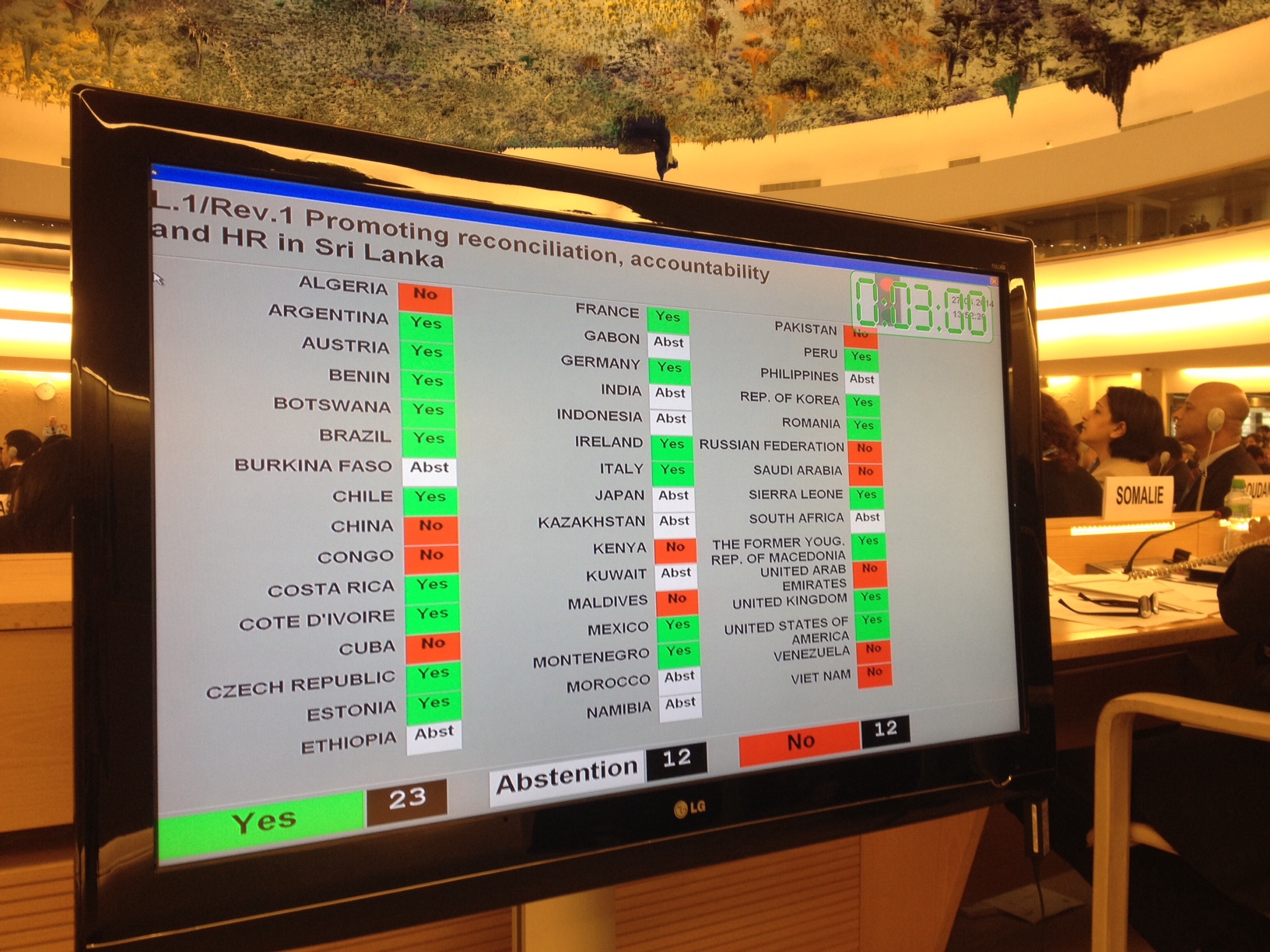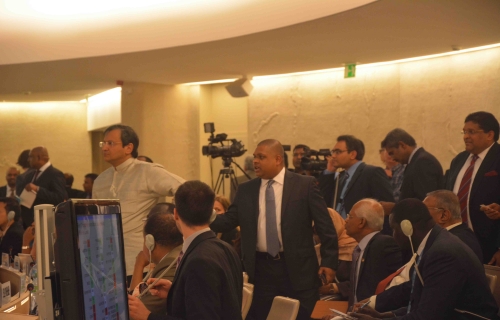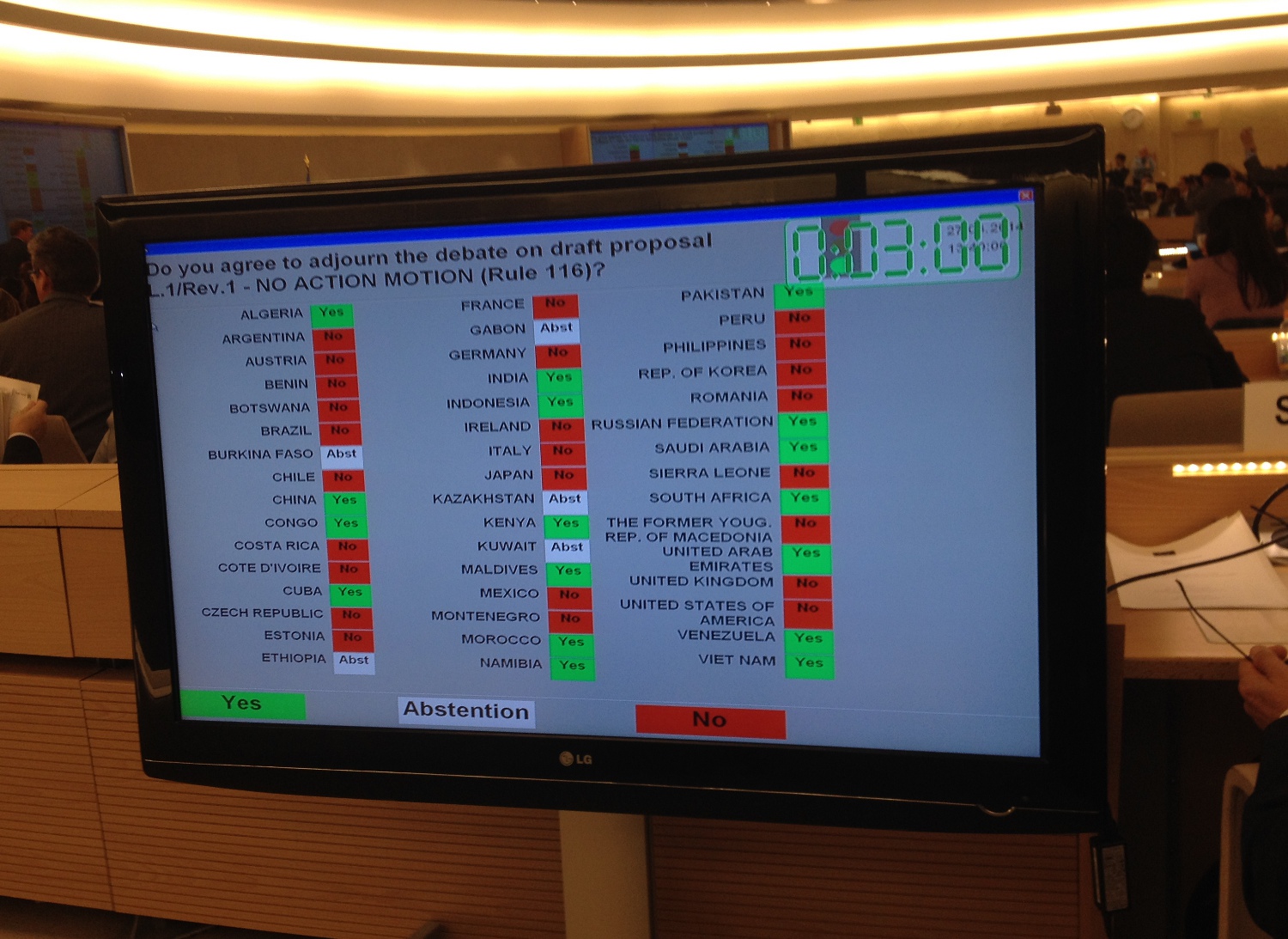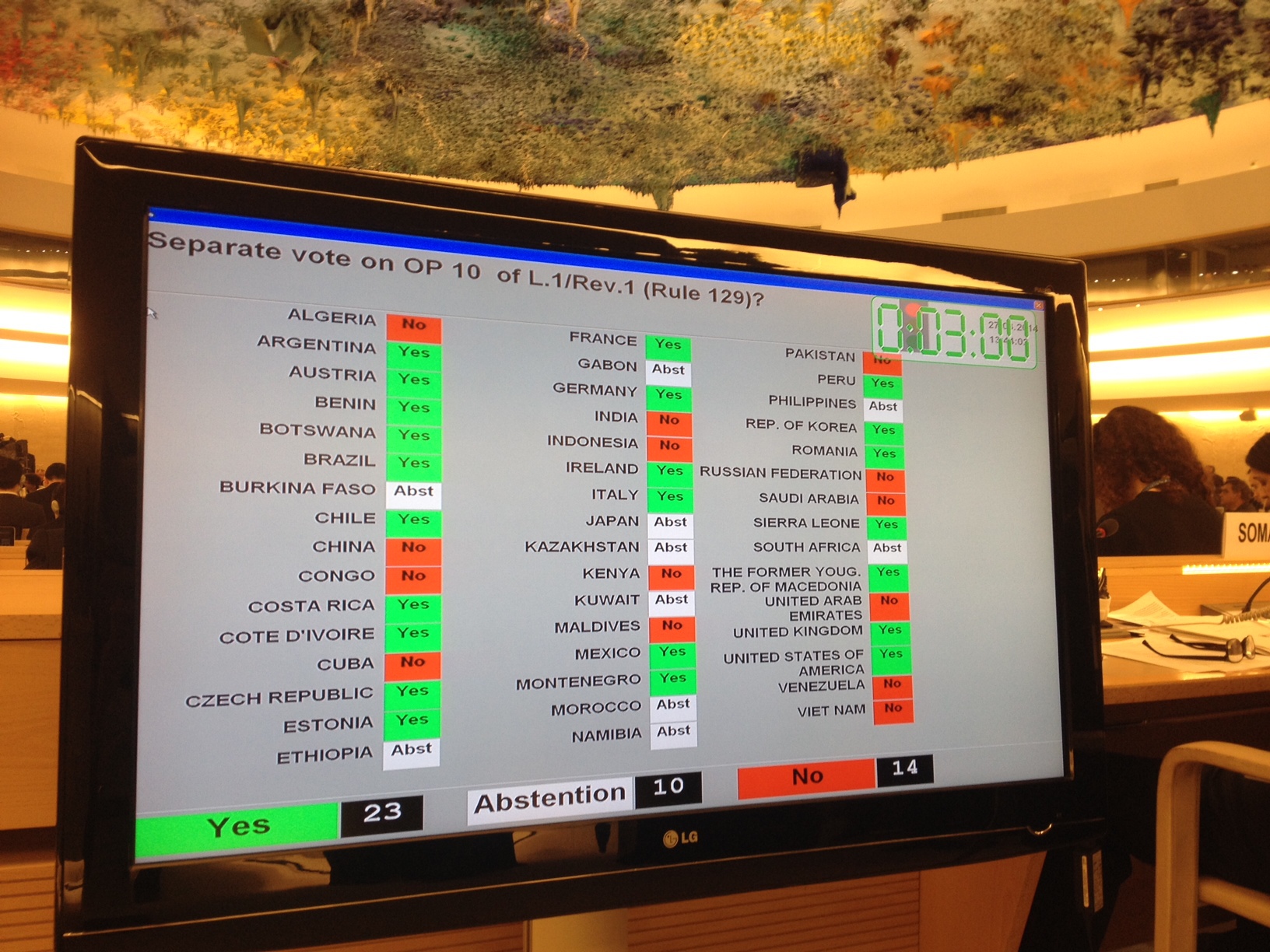 |
| Photograph Tamil Guardian |
The UN Human Rights Council on Thursday gave the Office of the High Commissioner for Human Rights to launch a comprehensive investigation into mass war time atrocities in Sri Lanka, passing the resolution.
23 Member states voted YES:
Argentina, Austria, Benin, Botswana, Brazil, Chile, Costa Rica, Cote d'Ivoire, Czech Republic, Estonia, France, Germany, Ireland, Italy, Mexico, Montenegro, Peru, Rep. of Korea, Romania, Sierra Leone, FRY Macedonia, United Kingdom, United States of America
12 Member states voted NO:
Algeria, China, Congo, Cuba, Kenya, Maldives, Pakistan, Russian Federation, Saudi Arabia, United Arab Emirates, Venezuela (Bolivarian Republic of), Viet Nam
12 Member states ABSTAINED:
Burkina Faso, Ethiopia, Gabon, India, Indonesia, Japan, Kazakhstan, Kuwait, Morocco, Namibia, Philippines, South Africa
See here for resolution adopted by the UN Human Rights Council.
Reaction from resolution sponsors and co-sponsors:
Welcoming the UNHRC resolution, the US Secretary of State John Kerry reiterated that ‘justice and accountability cannot wait’.
Mirroring his remarks, the British Prime Minister David Cameron said he was proud of British role in securing international investigation.
The US Ambassador to the UN, Samantha Power said accountability in Sri Lanka was overdue.
Commenting on the resolution, the US National Security Council spokesperson Caitlin Hayden and the US Ambassador to Sri Lanka Michele J. Sison, drew attention to the "deteriorating" human rights situation in Sri Lanka.
The co-chair of the United States Caucus on Ethnic and Religious Freedom in Sri Lanka, Congressman Bill Johnson, welcomed the vote, stating that "the time has come for accountability".
The US Senator Menendez, Chair of the US Senate Foreign Affairs Committee applauded the adoption of resolution, stating that accountability in Sri Lanka is long overdue.
The leader of Canada's Liberal Party, Justin Trudeau, welcomed the decision to establish an independent, international inquiry, and called on the Commonwealth to press Sri Lanka on on-going human rights violations.
Reactions from Tamil groups:
TNA hails UNHRC vote as ‘historic moment’, urges all communities to engage with investigation (27 Mar 2014)
We welcome HRC resolution, but it's not enough - Ananthy Sasitharan (27 March 2014)
Welcome Tamils assisting inquiry, but resolution cannot halt ongoing genocide - TNPF (29 Mar 2014)
Tamil disappointed by India at UN – TNA’s Suresh Premachandran (27 Mar 2014)
GTF thanks sponsors, warns of Govt non-cooperation (27 Mar 2014) and see also statement by GTF here (28 Mar 2014).
Tamil Civil Society Forum concerned at limitations of resolution (27 March 2014)
Tamil organisations welcome international investigation, hope findings will lead to justice (30 Mar 2014)
USTPAC welcomes long awaited international inquiry (29 Mar 2014)
BTF: welcome investigation, this is 'just the start' (28 Mar 2014)
'Fact finding mandate a significant step forward' - CTC (27 Mar 2014)
British Tamil Conservatives thank Cameron for fulfilling promise to Tamil people (29 Mar 2014)
‘Another step in a long and arduous path towards justice’ say UK university students (30 March 2014)
Tamils for Labour ‘commends’ UNHRC resolution (30 March 2014)
Sri Lanka: UN resolution the first step on rocky path to accountability - J.S. Tissainayagam (01 Apr 2014)
Reactions of human rights organisations / NGOs:
A turning point, and a new phase in the struggle for human rights - TAG (27 March 2014)
‘Enquiry must be urgent, rigorous and robust’ says No Fire Zone director (27 Mar 2014)
Investigation must be ‘robust and far reaching’ says Amnesty International (27 Mar 2014)
Independent investigation a welcome decision - HRW (27 Mar 2014)
‘Resolution sends strong message’ - ICJ (27 Mar 2014)
And... Sri Lanka's reaction:
Samarasinghe: we will not comply, must build on goodwill shown by India (29 Mar 2014)
Sri Lanka says US ‘bullied’ states to support UNHRC resolution, hails India’s abstention (28 Mar 2014)
Sri Lanka frees India fishermen to thank UN vote abstention (28 Mar 2014)
We reject UN resolution - President Mahinda Rajapaksa (27 Mar 2014)
 Sri Lanka’s Ambassador Ravinatha Aryasinha tells UN Human Rights Council that Sri Lanka categorically rejects resolution immediately before the vote. |
 |
| Sri Lankan delegation, including Ambassador Arysinha and MP Sajin Vass Gunawardena, watch the main screen as the final vote comes through. Photograph Tamilwin. |
The resolution 'Promoting reconciliation, accountability and human rights in Sri Lanka' A/HRC/25/L.1/Rev.1 was submitted by the United Kingdom of Great Britain and Northern Ireland, United States of America, Montenegro, the Former Yugoslav Republic of Macedonia and Mauritius.
The resolution was co-sponsored by Albania,* Austria, Belgium,* Bulgaria,* Canada,* Croatia,* Cyprus,* Denmark,* Estonia, Finland,* France, Georgia,* Germany, Greece,* Hungary,* Iceland,* Ireland, Italy, Latvia,* Liechtenstein,* Lithuania,* Luxembourg,* Mauritius,* Netherlands,* Norway,* Poland,* Portugal,* Romania, Saint Kitts and Nevis,* Sierra Leone, Slovakia,* Spain,* Sweden,* and Switzerland*.
(* indicates Non-Member State of the Human Rights Council).
India's decision to abstain from voting has been hailed by the Sri Lankan government, but widely criticised by a number of Tamil and Indian actors.
Reactions to India's decision to abstain:
US disappointed at India's actions during resolution vote (29 Mar 2014)
Samarasinghe: we will not comply, must build on goodwill shown by India (29 Mar 2014)
India's abstention is a betrayal to Tamils - Bishop of Mannar (01 Apr 2014)
Tamil Nadu fury at India abstention in UNHRC vote (28 Mar 2014)
India: UNHRC abstention was ‘in Tamils’ best interests’ (28 Mar 2014)
Sri Lanka says US ‘bullied’ states to support UNHRC resolution, hails India’s abstention (28 Mar 2014)
Sri Lanka frees India fishermen to thank UN vote abstention (28 Mar 2014)
India stands on the sidelines as UN investigation brings new hope - Amnesty India (28 Mar 2014)
Sampanthan defends India (28 Mar 2014)
Tamils disappointed by India at UN – TNA’s Suresh Premachandran (27 Mar 2014)
‘International investigation despite repeated betrayal of India’ – Save Tamils Movement (27 Mar 2014)
India labels resolution intrusive, calls for national mechanism (27 Mar 2014)
India to abstain from UNHRC resolution vote (27 Mar 2014)
| India's Permanent Representative to the UN in Geneva, Dilip Sinha answers questions by journalists from Tamil Nadu on India's decision to abstain, shortly after the vote. |
The Council's decision to vote on the resolution, was preceded by a tense debate, as Pakistan put forward a motion to postpone the vote until funding was identified and to vote to delete operative paragraph 10.
 |
| Council votes against no action motion put forward by Pakistan, to postpone the debate on the resolution, citing a lack of identified funding - 'Do you agree to adjourn the debate on draft proposal L1/Rev1?' 25 NO / 17 YES / 5 ABSTENTIONS Photograph Tamil Guardian |
The Council voted against the no action motion put forward by Pakistan, to postpone the debate on the resolution, citing a lack of identified funding - 'Do you agree to adjourn the debate on draft proposal L1/Rev1?' - with 25 against, 17 for, and 5 abstentions.
Notably, India supported Pakistan, voting in favour of postponing the vote.
The Philippines and Japan voted against postponing the debate, before going on to abstain from the actual vote.
South Africa, which abstained in the eventual vote, voted in favour of postponing the debate.
Addressing Pakistan's request to vote on a deletion of Operative Paragraph 10, the President of the Council proposed a vote on whether a separate vote should be conducted on the issue - 'Separate vote on OP 10 of L.1/Rev1 (Rule 129)?'.
 |
| Council votes in favour of a separate vote addressing Pakistan's request to have Operative Paragraph 10 deleted - 'Separate vote on OP 10 of L.1/Rev1 (Rule 129)?' 23 YES / 14 NO / 10 ABSTENTIONS Photograph Tamil Guardian |
The Council voted in favour of addressing Pakistan's proposal to delete Operative Paragraph 10 through a separate vote, however, the President ruled that given those in favour of the resolution in its entirety would vote for it, and those states opposed to Operative Paragraph 10 would vote against the entire resolution, a separate vote would not be necessary, putting the resolution forward for the final vote.
Key parts of Operative Paragraph 10 include:
"Takes note of the recommendations and conclusions of the High Commissioner regarding ongoing human rights violations and the need for an international inquiry mechanism in the absence of a credible national process with tangible results"
Requests the Office of the High Commissioner "to undertake a comprehensive investigation into alleged serious violations and abuses of human rights and related crimes by both parties in Sri Lanka during the period covered by the Lessons Learnt and reconciliation Commission, and to establish the facts and circumstances of such alleged violations and of the crimes perpetrated with a view to avoiding impunity and ensuring accountability, with assistance from relevant experts and special procedures mandate holders."
Tamil Guardian's editorial - 'The Beginning' (31 Mar 2014)
The UN Human Rights Council's adoption of a resolution last week calling on the Office of the High Commissioner for Human Rights to undertake a comprehensive investigation into Sri Lanka is a key milestone in the protracted Tamil struggle. The Council which in May 2009 praised Sri Lanka for its 'victory', now calls for it to be subject to an international inquiry. Whilst the intensification of Sri Lanka's militarised repression in the North-East, even during the Council's 25th session, underscores the inability of the resolution to lead to any immediate change on the ground, the significance of this moment - hard fought and long overdue – is nonetheless profound. Almost five years after the mass slaughter of tens of thousands of Tamils, in what international experts have described as war crimes, crimes against humanity, and even genocide, the international community has come to acknowledge what Tamils had consistently argued was the case: Sri Lanka lacks the will to deliver justice to the Tamil people, international intervention is essential.
[more]
 |
| Illustration by Keera Ratnam |
